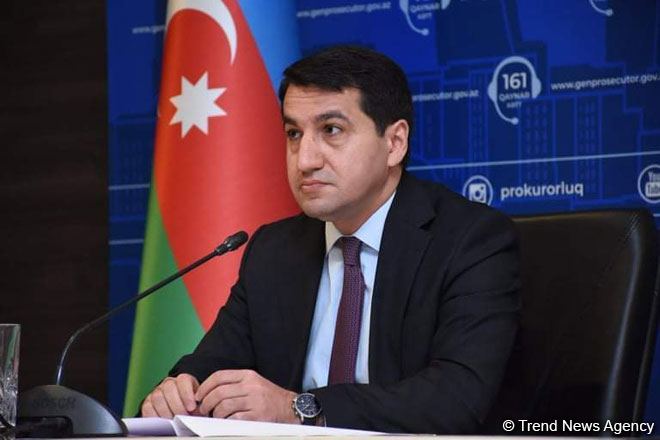BAKU, Azerbaijan, Oct. 7
Trend:
Armenian missile attacks reaffirmed aggressive nature of Armenia's military doctrine, Head of Foreign Policy Affairs Department of the Presidential Administration, Hikmat Hajiyev said in a Tweet, Trend reports.
“Before the escalation of situation in the line of contact Armenia openly threatened Azerbaijan's critical energy infrastructure/Mingachevir water reservoir with missile attacks. Recent missile attacks of Armenia reaffirmed such aggressive nature of Armenia's military doctrine,” he tweeted.
On October 6th, at about 9 pm (GMT+4), Armenian armed forces aimed its missile strikes at Azerbaijani Baku-Tbilisi-Ceyhan oil pipeline, the largest strategic project in the region, which plays an important role in Europe's energy security. However as a result of Azerbaijani Army's decisive measures the attack attempt was prevented and no damage to the pipeline was done.
Armenian Armed Forces launched a large-scale military attack on positions of Azerbaijani army on the front line, using large-caliber weapons, mortars and artillery on Sept. 27.
Azerbaijan responded with a counter-offensive along the entire front. As a result of retaliation, Azerbaijani troops liberated a number of territories previously occupied by Armenia, as well as take important, strategic heights under control.
The fighting continued into October 2020, in the early days of which Armenia has launched missile attacks on Azerbaijani cities of Ganja, Mingachevir, Khizi as well as Absheron district.
The conflict between the two South Caucasus countries began in 1988 when Armenia made territorial claims against Azerbaijan. As a result of the ensuing war, Armenian armed forces occupied 20 percent of Azerbaijan, including the Nagorno-Karabakh region and seven surrounding districts.
The 1994 ceasefire agreement was followed by peace negotiations. Armenia has not yet implemented four UN Security Council resolutions on the withdrawal of its armed forces from Nagorno Karabakh and the surrounding districts.






